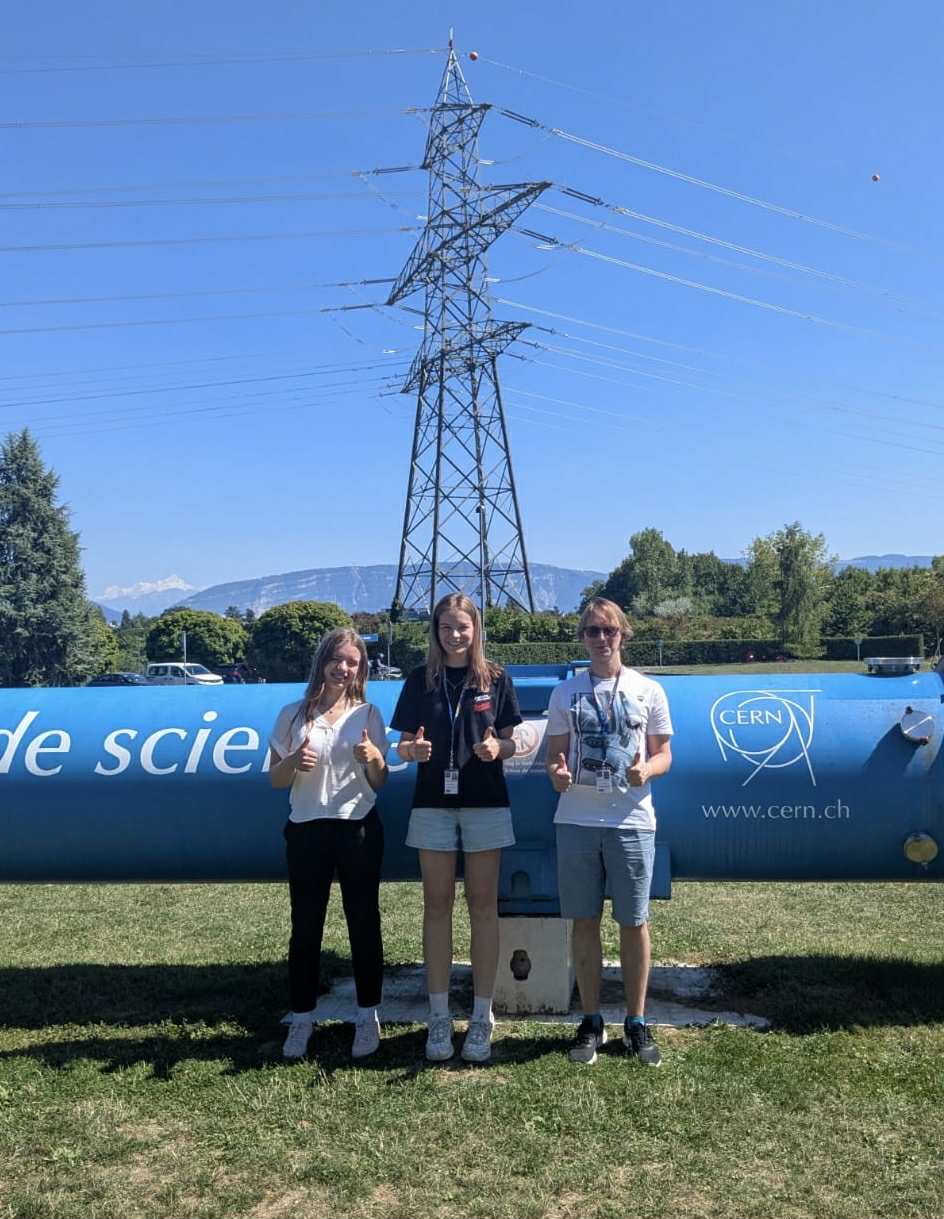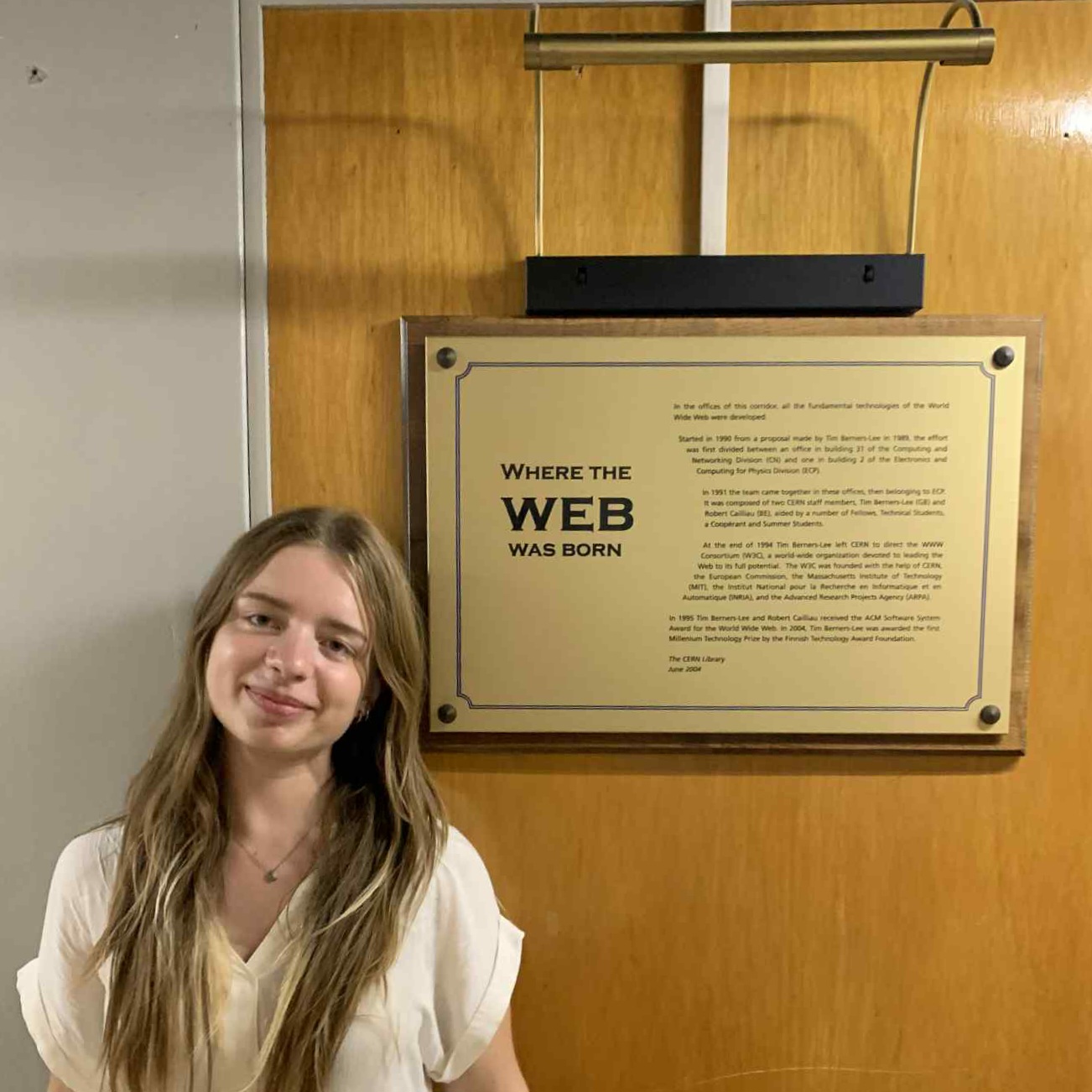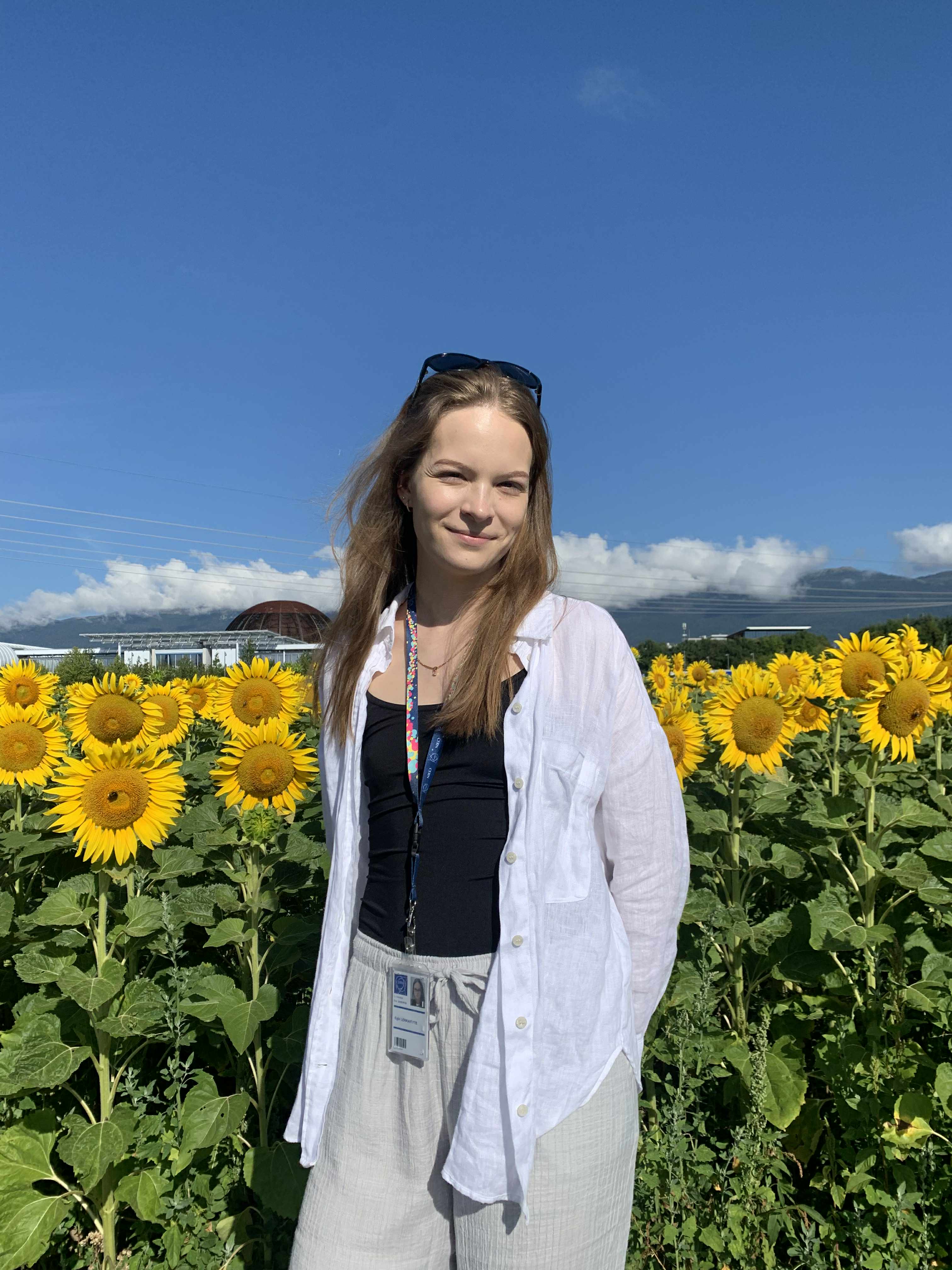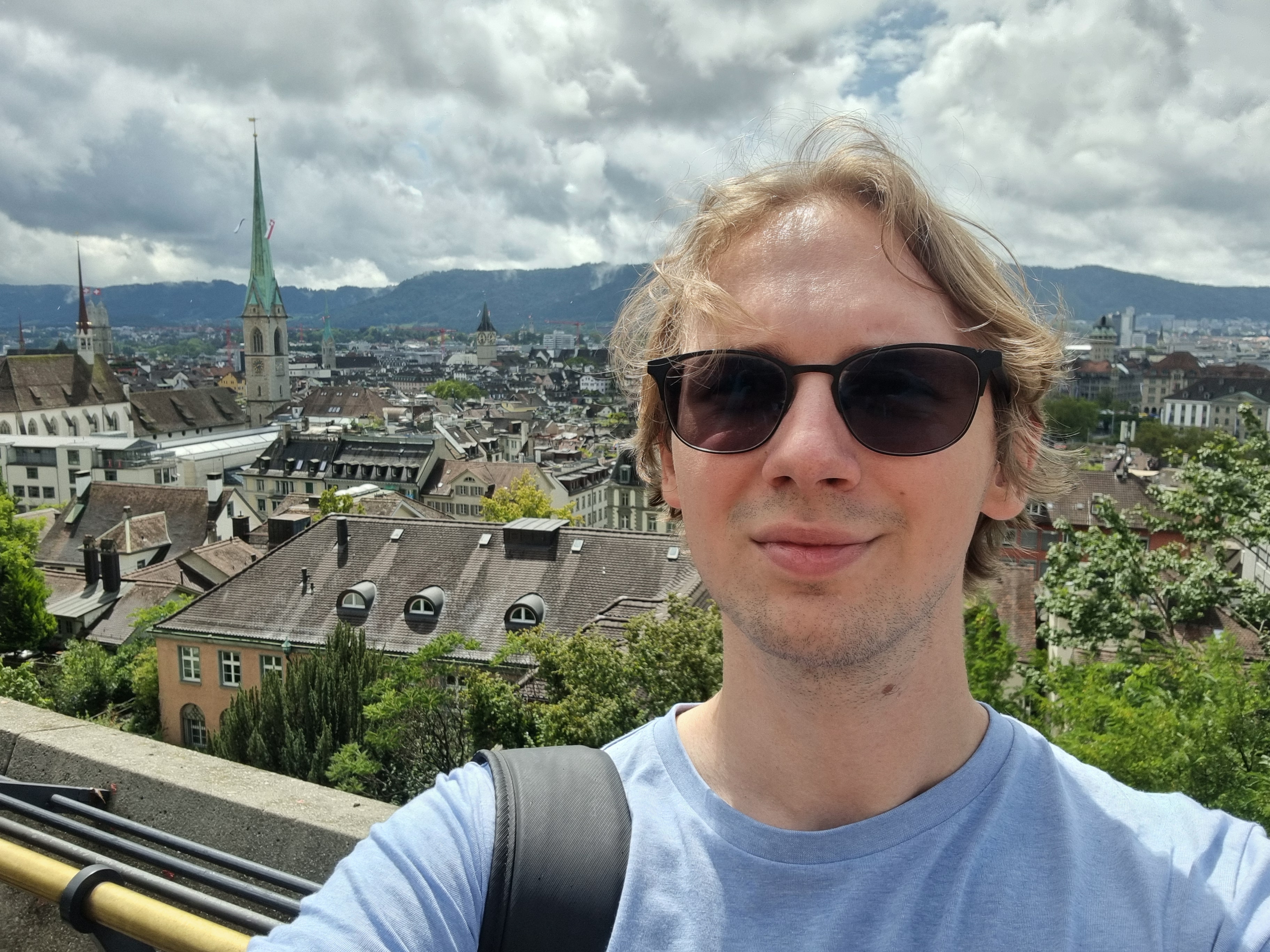Learning Beyond Borders: VU Students Share Insights from Their CERN Internship

Three Vilnius University (VU) students – Patrikas Styra, Eglė Lenkaitytė, and Rūta Lomsargytė – have returned from an intensive internship at the laboratory of CERN, the European Organisation for Nuclear Research, situated on the Swiss-French border. Over the course of several months, they immersed themselves in the world’s largest particle physics laboratory, gaining hands-on experience and contributing to cutting-edge scientific projects. Their work spanned advanced data analysis for the next-generation particle accelerator experiments, a virtual assistant for data analysis, and tools for experimental data quality monitoring– offering not only an incentive towards a deeper understanding of particle physics but also a chance to collaborate on global research initiatives.
Impressive Equipment and International Collaboration
Students had a unique opportunity to engage closely with the scientific community at CERN and to explore the world of particle physics. During their visit, they toured the detectors of the Large Hadron Collider (LHC) and, between July and September, carried out their own scientific projects.
E. Lenkaitytė spent twelve weeks at CERN and had the opportunity to see two of the four major LHC experiments. “I visited the control centres for the CMS and ATLAS detectors and even descended nearly 100 metres underground near the CMS detector. I also toured the Antimatter Factory, the Synchrocyclotron – a type of cyclic resonant accelerator used in particle physics experiments – and several smaller experiments. I was deeply impressed by the technology used for particle detection and the sheer scale of the equipment.”
R. Lomsargytė shared a similar experience, describing the internship as an invaluable opportunity to attend lectures on particle physics and related fields, and to learn from leading experts in high-energy physics. “Working on the project gave me insight into a different work culture. What struck me most was the international community: people studying physics, programming, engineering, and related disciplines from all over the world are working together in one place. From such a diverse group, I learned about their projects and personal journeys that led them to CERN. This was incredibly motivating and inspired me to keep advancing and to aim at contributing to global experiments like these.”

P. Styra spent ten weeks on his internship at CERN. He was impressed by the infrastructure of the European Organisation for Nuclear Research: “Spaces and equipment I had never seen before – the Antimatter Factory, the CERN Data Centre, the CMS detector area, even the CMS office itself was interesting and unique. I’m leaving CERN with many memorable experiences, including hikes, professional challenges, and new connections. I’ve also learned several new technologies, which I’m already applying both personally and academically,” he said.
Virtual Assistants and Enhanced Data Analysis
With the growing use of large language models across various fields, including high-energy physics, it has been observed that the existing models often provide inaccurate answers to questions related to data analysis at CERN’s LHC. “The aim was to adapt one of the large language models to develop a virtual assistant that could support data analysis for the CMS experiment. By asking a question in a natural language, the assistant generates the necessary code, allowing us to obtain the desired result, for example, a histogram,” explained R. Lomsargytė about her scientific project. Working in a relatively new field, the young researcher combined physics with large language models to create such a tool. She is confident that the conclusions drawn will be applied in future research.
P. Styra contributed to ensuring data quality in one of the major experiments. The CMS detector collects vast amounts of information about particle collisions. To ensure that this data remains reliable and accurate, the detector’s calibration parameters are continuously updated, taking into account factors such as ageing, noise, pressure, and changes in the magnetic field. “I focused on Data Quality Monitoring and made updates to the software that allow different conditions of the subdetectors to be specified. Once approved, these conditions are saved in the database and used for further data processing,” he explained.
E. Lenkaitytė’s scientific project was related to the next-generation particle accelerator – the CERN Future Circular Collider (FCC), which is planned to be developed. Her goal was to create a documented example of data analysis code using the Coffea framework (Columnar Object Framework for Effective Analysis). The physicist explored how this modern and efficient analysis tool, which is designed specifically for processing large-scale particle physics data, could enhance the development of analysis workflows. “I carried out the analysis using simulated data from the FCC-ee (Future Circular Collider electron-positron mode). I investigated how to adapt the code to the FCC data structures and analysis requirements, and examined the advantages compared to other data analysis methods: efficient task distribution, modular analysis architecture, and the ability to easily scale the analysis to larger datasets,” explained the young researcher, who contributed to the development of a new data analysis system.

Passion for Particle Physics
E. Lenkaitytė developed an interest in particle physics during her third year of undergraduate studies. While working at the Institute of Photonics and Nanotechnology at the Faculty of Physics, she actively sought opportunities to engage with CERN’s research activities. After completing an internship at the Institute of Theoretical Physics and Astronomy, she wrote her bachelor’s thesis based on open data from the CMS experiment at CERN. Having spent the summer on an internship, she is now continuing her studies in the master’s programme in theoretical physics and astrophysics.
Third-year physics student R. Lomsargytė shared that, while exploring which field of physics she would like to specialise in, she studied the CMS experiment data analysis within the High-Energy Proton Collision Research Group at the Faculty of Physics. “I became genuinely interested in the research carried out in this area, so I decided to take the opportunity to do an internship on a related project,” she said.
P. Styra first heard about the European Organisation for Nuclear Research at school. “I visited CERN with classmates, saw the Synchrocyclotron and toured the museum, but I knew I wanted to contribute to CERN’s mission in some way,” said the programmer, who is currently pursuing a master’s degree in DeepTech entrepreneurship.

All three participants emphasised that they would strongly recommend this kind of internship experience to others. “Going abroad for an internship not only broadens horizons but also provides a wealth of new knowledge and experiences. I’m returning not only having learned new things, but also having had an enjoyable summer, meeting people from all over the world and making new friends,” said E. Lenkaitytė.
“The Lithuanian community is very welcoming, and the atmosphere at CERN is incredibly friendly. There are plenty of activities nearby – Swiss mountains and towns, Via Ferratas, and hiking trails,” added P. Styra.
R. Lomsargytė highlighted that her experience at CERN changed her perspective on academic studies and scientific work, and gave her valuable insight into the international high-energy physics community. “I realised that the programming foundations and problem-solving skills I gained at the Faculty of Physics are useful not only in my studies but also in future projects. The experience gave me a deeper understanding of particle physics research and encouraged me to continue contributing to the development of new tools in high-energy physics,” she explained.
The Experimental Nuclear and Particle Physics Center of the Faculty of Physics of VU is currently implementing a project under the IMPRESS-U programme, funded by the Research Council of Lithuania. The project “IRIS-HEP: Expanding Research Software Development Collaborations in Particle Physics to Ukraine, Poland, and Lithuania” enables VU students to undertake internships at CERN. All participants from this year’s programme have already returned to Lithuania.